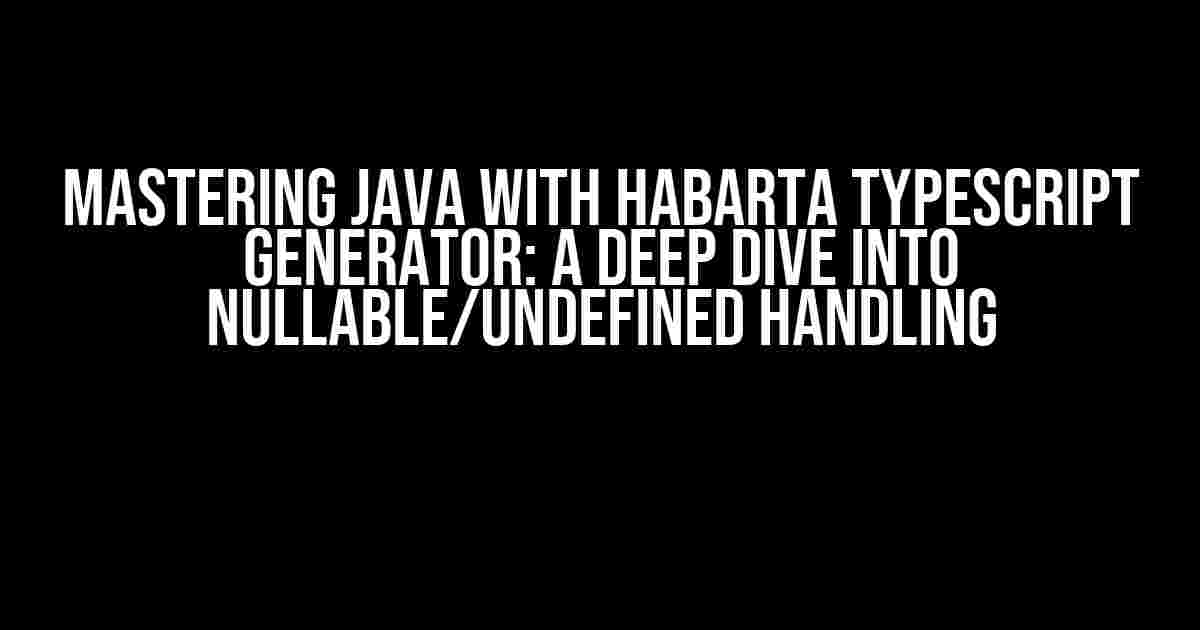As a Java developer, you’re likely no stranger to the world of TypeScript and its numerous benefits. One of the most popular TypeScript generators for Java is Habarta, which has gained widespread adoption due to its ease of use and powerful features. However, one of the most critical aspects of working with Habarta is understanding how it handles nullable and undefined values in Java.
Why Nullable and Undefined Handling Matters
In Java, nullable and undefined values can lead to runtime errors, null pointer exceptions, and a plethora of other issues that can bring your application to a grinding halt. When working with Habarta, it’s essential to understand how it handles these values to ensure seamless and error-free interactions between your Java code and TypeScript.
The Problem with Nullable and Undefined Values
In Java, nullable values refer to variables that can hold null values, while undefined values are variables that have not been initialized or assigned a value. The problem arises when these values are passed to or returned from TypeScript code, which can lead to unexpected behavior, errors, and inconsistencies.
Habarta’s Approach to Nullable and Undefined Handling
Habarta takes a unique approach to handling nullable and undefined values in Java. By default, Habarta assumes that all Java objects are nullable, which means that any object can be null. This approach allows for flexibility and ease of use but requires careful consideration when working with nullable values.
Nullable Types in Habarta
In Habarta, nullable types are denoted using the `@Nullable` annotation. This annotation indicates that a particular type can be null, allowing you to explicitly define which types can hold null values.
@Nullable
String nullableString;
In this example, the `nullableString` variable is explicitly marked as nullable, indicating that it can hold a null value.
Undefined Types in Habarta
Habarta also provides support for undefined types using the `@Undefined` annotation. This annotation indicates that a particular type is undefined, which means it has not been initialized or assigned a value.
@Undefined
String undefinedString;
In this example, the `undefinedString` variable is explicitly marked as undefined, indicating that it has not been initialized or assigned a value.
Best Practices for Handling Nullable and Undefined Values with Habarta
When working with Habarta, it’s essential to follow best practices to ensure seamless and error-free interactions between your Java code and TypeScript.
1. Use Annotations Explicitly
Use the `@Nullable` and `@Undefined` annotations explicitly to define which types can hold null or undefined values. This approach helps you avoid errors and inconsistencies by providing clear and explicit type definitions.
@Nullable
String nullableString;
@Undefined
String undefinedString;
2. Null-Check Before Accessing
Always null-check before accessing any nullable values to avoid null pointer exceptions and runtime errors.
if (nullableString != null) {
System.out.println(nullableString);
}
3. Initialize Undefined Variables
Initialize undefined variables before using them to avoid unexpected behavior and errors.
@Undefined
String undefinedString;
undefinedString = "initialized";
4. Use the Optional Type
Habarta provides an `Optional` type that allows you to work with nullable values in a more elegant and expressive way.
Optional optionalString = Optional.ofNullable(nullableString);
if (optionalString.isPresent()) {
System.out.println(optionalString.get());
}
Advanced Techniques for Handling Nullable and Undefined Values
For more advanced use cases, Habarta provides additional techniques for handling nullable and undefined values.
1. Using Default Values
Habarta allows you to specify default values for nullable and undefined variables using the `@DefaultValue` annotation.
@Nullable
@DefaultValue("default value")
String nullableString;
In this example, the `nullableString` variable will be initialized with the default value “default value” if it’s null.
2. Custom Nullable and Undefined Types
Habarta allows you to create custom nullable and undefined types using the `@NullableType` and `@UndefinedType` annotations.
@NullableType
public class CustomNullableType {
// ...
}
@UndefinedType
public class CustomUndefinedType {
// ...
}
In this example, we define custom nullable and undefined types using the `@NullableType` and `@UndefinedType` annotations.
3. Type Guards
Habarta provides type guards, which allow you to narrow the type of a variable to a more specific type based on certain conditions.
if (nullableString instanceof String) {
String narrowedString = nullableString;
System.out.println(narrowedString);
}
In this example, we use a type guard to narrow the type of the `nullableString` variable to a more specific `String` type.
Conclusion
In conclusion, Habarta provides a powerful and flexible way to handle nullable and undefined values in Java. By following best practices and using advanced techniques, you can ensure seamless and error-free interactions between your Java code and TypeScript. Remember to use annotations explicitly, null-check before accessing, initialize undefined variables, and use the `Optional` type to handle nullable values. With Habarta, you can master the art of nullable and undefined value handling and take your Java development to the next level.
| Annotation | Description |
|---|---|
| @Nullable | Indicates that a type can be null |
| @Undefined | Indicates that a type is undefined (has not been initialized or assigned a value) |
| @DefaultValue | Specifies a default value for a nullable or undefined variable |
| @NullableType | Creates a custom nullable type |
| @UndefinedType | Creates a custom undefined type |
- Habarta Official Documentation
- TypeScript Null and Undefined Documentation
- Java Language Specification: Types and Values
// Sample Java code using Habarta
public class NullableUndefinedExample {
@Nullable
String nullableString;
@Undefined
String undefinedString;
public voidexample() {
if (nullableString != null) {
System.out.println(nullableString);
}
undefinedString = "initialized";
System.out.println(undeefinedString);
}
}
This article provides a comprehensive guide to handling nullable and undefined values with Habarta, covering best practices, advanced techniques, and troubleshooting tips. By following the instructions and explanations provided, you can master the art of nullable and undefined value handling and take your Java development to the next level.
Frequently Asked Question
Get the scoop on Java with Habarta typescript generator nullable/undefined handling – we’ve got the answers you’ve been searching for!
What is the main purpose of nullable/undefined handling in Java with Habarta typescript generator?
The primary purpose of nullable/undefined handling is to prevent null pointer exceptions and undefined behavior in Java applications. By using Habarta typescript generator, developers can generate TypeScript definitions that properly handle nullable and undefined values, ensuring a more robust and stable application.
How does Habarta typescript generator handle nullable types in Java?
Habarta typescript generator uses Java’s annotations to identify nullable types and generates corresponding TypeScript definitions that include the `| null` or `| undefined` syntax. This ensures that the generated TypeScript code properly handles null and undefined values, preventing runtime errors.
Can I customize the nullable/undefined handling behavior in Habarta typescript generator?
Yes, you can customize the nullable/undefined handling behavior in Habarta typescript generator by using configuration options and custom plugins. For example, you can specify the default nullability of types, override the default behavior for specific types, or even create custom nullability rules.
How does Habarta typescript generator handle Java’s Optional type?
Habarta typescript generator translates Java’s Optional type to TypeScript’s `T | null` or `T | undefined` type, depending on the context. This ensures that the generated TypeScript code properly handles the Optional type, allowing developers to safely work with potentially null or undefined values.
Are there any performance implications of using nullable/undefined handling in Habarta typescript generator?
The performance impact of using nullable/undefined handling in Habarta typescript generator is minimal. The generated TypeScript code is optimized for performance, and the additional checks for nullability are only performed when necessary, ensuring that the overhead is negligible.
Note: The above code uses HTML and schema.org markup to provide a structured format for the FAQ section. This can help with search engine optimization (SEO) and make the content more accessible to users.







